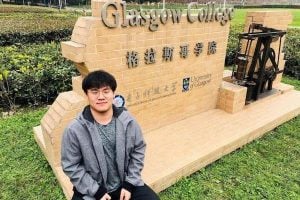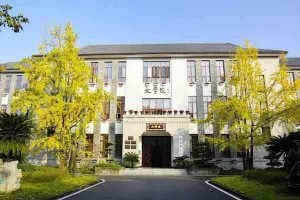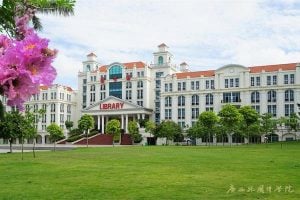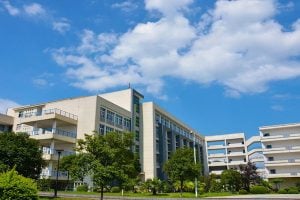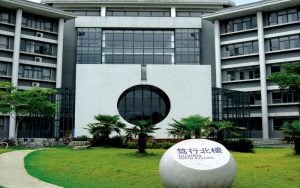Guizhou Normal University
 |
 |
 |
 |
Introduction to Guizhou Normal University
Guizhou Normal University (贵州师范大学, website)’s predecessor, “National Guiyang Normal University”, was founded in 1941 and was one of the eight national normal colleges at that time. In October 1950, it was renamed “Guiyang Teachers College”; in October 1954, the Ministry of Education commissioned the Guizhou Provincial People’s Government to manage the Guiyang Teachers College; in November, the Guizhou Provincial People’s Government officially took over the college; in 1985 it was renamed “Guizhou Normal University”, in 1996 It was identified as a provincial key university by the People’s Government of Guizhou Province; it was merged with the former Guizhou Institute of Technology and Technology in 2004; it was included in the “Counterpartnership Program for Supporting Western Universities in the Ministry of Education” in 2006, forming a counterparty support relationship with Xiamen University; July 2013 Was officially approved as a doctoral authority in January; it became a college jointly established by the Ministry of Education and the People’s Government of Guizhou Province in 2015; signed a strategic cooperation agreement with Lanzhou University in 2016 to open a new situation of in-depth cooperation and collaborative innovation; The only university that has entered the “111 Project” of the Ministry of Education / State Council of Foreign Experts Affairs.
Guizhou Normal University is located in the forest city of Guiyang, the capital of Guizhou Province. It has three campuses, which are located in Yunyan District, Baiyun District (Qiushi College) and Huaxi District, covering an area of nearly 2,800 acres. There are 38,000 full-time students (including more than 10,000 students from Qiushi College and 2,830 graduate students). There are 24 colleges, 1 continuing education college, and 1 independent college (Qushi College).
Guizhou Normal University currently has 4 domestic first-class construction disciplines in Guizhou Province, 4 first-class construction disciplines in the Guizhou Province region, 6 first-level discipline doctorate authorization points (covering 32 second-level disciplines), and 22 first-level discipline master’s degree authorization (Covering 107 second-level disciplines), 1 independent second-level discipline master’s degree authorization point, 6 autonomously set second-level discipline master’s degree authorization points, 9 master’s degree categories (fields) authorization points, 81 undergraduate majors Have the right to waive the undergraduate degree for master’s degree. There are 7 national specialty undergraduate specialty construction sites, 5 national undergraduate specialty comprehensive reform pilot projects, and provincial “first-class universities” construction projects, which have 11 categories: 5 first-class professional projects (including 1 cultivation project), and first-class 2 course projects, 2 first-class platform projects, 2 first-class teacher projects, 2 Ministry of Education Outstanding Teacher Training Reform Projects, 4 Ministry of Education Outstanding Middle School Teacher Training Projects, 10 provincial undergraduate professional comprehensive reform pilot projects, 9 Provincial Excellent Talents Training Program Project, 7 Provincial University Students Innovation and Entrepreneurship Training Centers, 11 Provincial Key Disciplines, 13 Provincial Key Disciplines, 19 Provincial University Demonstrative Undergraduate Programs (Characteristics) Philosophy, economics, law, pedagogy, literature, history, science, engineering, agronomy, management, arts and other 11 disciplines form a comprehensive discipline layout featuring teacher education.
Guizhou Normal University currently has 2572 faculty members, including 1785 faculty members, including 299 professors and 677 associate professors, 593 of whom have a doctorate degree and 945 have a master’s degree. The school’s faculty includes 1 professor specially invited by the “Changjiang Scholars”, 1 cultural master of the Central Propaganda Department and one of the “four batches” talents, 1 leader in the national “Ten Thousands Program” philosophy and social sciences, and national middle-aged and young people. 1 outstanding contribution expert, 1 academic and technological leader of National Engineering Technology Research Center, 1 national-level talent project in the new century, 4 talents in the New Century Excellent Talents Support Program of the Ministry of Education, and 1 national-level “teaching teacher” 1 People, 2 national model teachers, 10 national outstanding teachers, 1 national outstanding professional and technical talent, 4 national May 1 labor medal winners, 1 national teacher moral standard, 1 national teacher advanced individual, 1 national outstanding science and technology 1 worker, 2 outstanding teachers of national ideological and political theory courses, 2 advanced workers of party building and ideological and political education in national colleges and universities, 1 excellent teacher of two national courses, and annual influencers of national ideological and political theory courses 3 Person, 1 national excellent social science popularization expert, 13 members of the Professional Steering Committee of the Ministry of Education, 31 experts enjoying special allowances of the State Council, and special provincial government benefits 17 subsidy experts, 3 core experts in Guizhou Province, 26 provincial management experts, 13 outstanding teachers in Guizhou Province, 19 “educational teachers” in provincial universities, 5 “Qianling scholars” in philosophy and social sciences in provincial universities, Guizhou Province 1 outstanding scientific and technological worker, 20 provincial outstanding young scientific and technological talents, 3 provincial young innovative talents award, 12 provincial young scientific and technological awards, 27 provincial high-level innovative talents (22 talents at thousand levels, 5 talents at 100 levels) 2. There are 26 academic leaders in philosophy and social sciences in provincial universities, and 7 famous teachers in ideological and political theory courses in provincial universities. The faculty consists of 30 specially-appointed professors of “Migratory Birds” (including 2 academicians, 2 “Changjiang Scholars” specially-appointed professors, 2 national “10,000 People Program” leading talents, and 1 National Outstanding Youth Fund recipient).
Guizhou Normal University is an important base for the cultivation of high-quality innovative talents in the province. In January 2017, the school won the title of “the first batch of national demonstration universities for deepening innovation and entrepreneurship education reform.” In June 2017, he was selected as a standing director of the National University Students Innovation and Entrepreneurship Practice Alliance and a member of the China University Innovation and Entrepreneurship Education Alliance. In December 2017, he was selected as the “National University Practice, Education, Innovation and Entrepreneurship Base” by the Ministry of Education. There are 1 national university practice base outside the school, 2 national experimental teaching demonstration centers, 1 national professional and technical personnel continuing education base, 1 national education modernization monitoring and research center, and 1 national teacher training base (education National College Ideological and Political Theory Teachers Social Practice Training Base), 1 National Education Comprehensive Experimental Training Demonstration Center, 1 National Social Sports Instructor Training Base, 1 Provincial Teacher Teaching Development Demonstration Center, 2 Provincial Levels Talent training base for key disciplines, 5 provincial experimental teaching demonstration centers. China International Talents Foreign Language Examination (BFT) Guizhou Examination Training Center, Guizhou Province Ideological and Political Theory Teacher Training Base, Guizhou Primary and Middle School Backbone Teacher Training Base, Guizhou Mental Health Backbone Teacher Training Center, Guizhou University Student Cultural Quality Education Base, Guizhou Province Teacher Education Modernization Teaching Practice Base, National Foreign Language Proficiency Test Guizhou Examination Center, Information Technology and Application Training Base, Higher Education Education Technology Training Center, Guizhou Higher Education Teacher Training Center, Guizhou Education Department Teacher Qualification Guidance Center , Guizhou Provincial Teacher Teaching Development Demonstration Center, Guizhou United Front Theory Research Base, Guizhou Clean Government Culture Research Base, Provincial Excellent Campus Culture Education Base, Guizhou Provincial College Entrance Examination Paper Base, Guizhou Fine Arts Design Professional Examination Base, Guizhou Province Colleges and Universities Physical Education Examination Base, Guizhou Province Intangible Cultural Heritage Inheritance Group Training Base, China Intangible Cultural Heritage Inheritance Group Study and Training Base, “China · Guiyang Big Data Tourism Research (Actual ) Base, “Chinese traditional culture heritage base – Guizhou batik heritage base, Guizhou Province, volunteer service projects Incubation Center, Research Center of the Communist Youth League of Guizhou Province, ecological and cultural international exchange center affiliated schools.
Guizhou Normal University has 1 National Engineering Technology Research Center, 1 National Local Joint Engineering Laboratory, 1 National University Science Park, 1 National Small and Micro Enterprise Pioneering and Innovation Demonstration Base, 1 National Crowd Space, 1 111 Ministry of Education talent introduction bases, 1 provincial and ministry joint national key laboratory cultivation base, 1 Ministry of Education science and technology innovation talent team, 6 provincial humanities and social science research bases, 7 provincial key laboratories, 6 Provincial Engineering Research Center, 6 Provincial Engineering Labs, 1 National Remote Sensing Center Guizhou Branch, 12 Provincial Scientific and Technological Innovation Talent Teams, 4 Provincial Collaborative Innovation Centers, 1 Provincial Astronomical Research and Education Center, 1 Guizhou Provincial Industry-University-Research Demonstration Base (the only university in the province), 2 academician workstations. The school’s analysis and testing center is the first batch of “material evidence judicial appraisal office” approved by Guizhou Provincial Department of Justice, and “Guizhou Chemical Reagent Quality Supervision and Inspection Station” approved by Guizhou Provincial Bureau of Quality and Technical Supervision. Published journals such as “Journal of Guizhou Normal University” (Social Science Edition), “Journal of Guizhou Normal University” (Natural Science Edition) and “Guizhou Normal University Newspaper”, among which “Journal of Guizhou Normal University” (Social Science Edition) is The National Top 100 Social Science Journal, the core journal of Chinese humanities and social sciences, and the first-level journal of Guizhou Province. The Journal of Guizhou Normal University (Natural Science Edition) is a core journal of science and technology in China. Since 2014, the school has undertaken a total of 772 scientific research projects at or above the provincial and ministerial level (including provincial and ministerial levels), including 1 national key research and development plan project, 246 national research projects, and 526 provincial and ministerial research projects. 418 million yuan; won 162 scientific research awards at the provincial or ministerial level or above; 2 national teaching achievement awards and 24 provincial teaching achievement awards; 2 international literature and art awards; 316 patents were approved and 339 academic works were published. More than 4,600 academic papers have been indexed by SCIE, SSCI, SCI, EI, ISTP, ISSHP, CSSCI, CSCD.
Guizhou Normal University wireless network covers most public areas and library reading areas. Digital campuses based on public data platforms serve the entire school. The library has rich resources and distinctive features. The area of the three campuses is 62,000 square meters. The library has more than 2.69 million paper documents, including more than 100,000 ancient books, and annual subscriptions to more than 2,250 paper and periodicals in Chinese and foreign languages. The total number of digital resources is 114.72 TB, of which more than 1.58 million electronic books are available for use in Chinese and foreign databases. 48, including 21 self-built feature databases. It is the “National Key Ancient Book Protection Unit”, “CALIS (China Higher Education Document Security System) Guizhou Province Document Information Service Center”, and “National Basic Information Center for Cultural Information Resources Sharing Project”.
Guizhou Normal University has established long-term cooperation and exchange relationships with universities and research institutions in the United States, Britain, Portugal, Russia, Australia, Japan, South Korea, Thailand, Indonesia, Malaysia, Vietnam, Cambodia and other countries and Taiwan. , Portugal, Russia, South Korea, Japan, Thailand, Indonesia, Malaysia, Switzerland, and many other universities in Taiwan and Taiwan have teacher-student exchange programs. The opening of schools has been further strengthened. It is one of the institutions that undertakes the task of cultivating international students for Chinese government scholarships in China. It has co-organized the British Higher Education Diploma Program (SQA-AD) in cooperation with the British Scottish Qualifications Management Committee and opened in cooperation with the Overseas Education Service Centre of the Ministry of Education. Undergraduate International General Education Course (IGEC), the school has a Chinese Proficiency Test (HSK) test site, can organize the implementation of the relevant Chinese Proficiency Test.
Guizhou Normal University will take the opportunity of co-construction of provinces and ministries as an opportunity to continue to seize opportunities, accelerate development, highlight features, and promote leapfrogging. It will work hard to accelerate the construction of a high-level teaching and research university with distinctive teacher education characteristics and multidisciplinary coordinated development.
Teaching Program
![]() ISAC University Teaching Program
ISAC University Teaching Program
Related Universities


